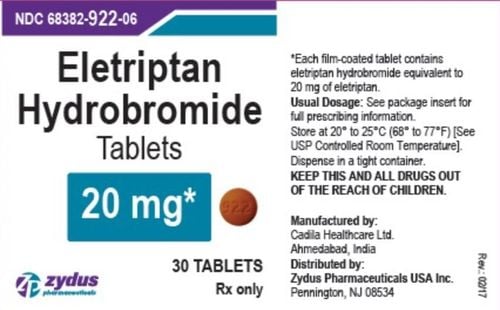This is an automatically translated article.
Nicergoline drug, also known as sermion, nicebium, nilogrin, nicergoline, belongs to the subgroup of neurotropic drugs and nerve tonics. The drug is indicated in the cases of acute and chronic cerebrovascular metabolic disorders, migraine of vascular origin, retinal vascular disorders,... So what does Nicergoline do?
1. Uses of the drug Nicergoline
What is Nicergoline? Nicergoline belongs to the group of psychotropic drugs and neurotonics. Nicergoline drug is effective in the treatment of the following cases:
Acute and chronic cerebrovascular metabolic disorders such as cerebral atherosclerosis, transient cerebral ischemia, thrombosis and cerebrovascular occlusion. Acute and chronic disorders of peripheral vascular metabolism such as arterial structure and function of extremities, other syndromes due to altered peripheral perfusion, Raynaud's syndrome. Migraine of vascular origin An adjunct to treatment in clinical situations associated with increased inhibition of platelet aggregation and arterial pressure. Retinal vascular disorders such as diabetic retinopathy, retinal thrombosis, macular degeneration, and sclerosis of the retina. Vestibular disorders in blood vessels such as auditory hallucinations, hearing loss, dizziness. In addition, some other effects of the drug that are not listed on the approved drug label, but in some cases, the doctor may prescribe the use of Nicergoline . Therefore, before taking the medicine, consult your doctor.
2. How to use Nicergoline
What does Nicergoline do? Nicergoline is available in many different forms including oral tablets with the strength of Nicergoline 30mg or 10mg, ampoules of 4mg.
Dosage depends on each subject and disease condition as follows:
Usual dose for adults with peripheral vascular disease or mental breakdown associated with cerebrovascular insufficiency: For tablet dosage form you use 10mg orally 3 times a day. Maintenance dose is from 5-10mg orally 3 times/day. The maximum dose is up to 60mg per day in divided doses. For the intramuscular form, you use 2-4mg injected 2 times a day. For intravenous infusion, use 4-8 mg diluted with 250 ml of physiological saline solution injected slowly over 30 minutes. For patients with renal insufficiency, the dosage should be reduced. Dosage for children has not been studied and decided, so before using it, it is necessary to consult a doctor. Patients can take the drug with or without food. However, to reduce stomach irritation you can take it with food and need to take the whole tablet with a full glass of water. Use Nicergoline exactly as directed by your doctor, do not use more, smaller or longer than prescribed. Use Nicergoline regularly to get the most benefit from it and you can stop taking it if any new symptoms appear or your condition does not improve after 7 days. Absolutely do not abuse the drug for too long for a long time. This does not make the patient's condition better, but also increases the risk of unwanted effects.
3. Undesirable effects when using the drug Nicergoline
Nicergoline medicine can cause some unwanted and common side effects that can be mentioned as:
Gastrointestinal disorders Lowering blood pressure, especially after the infusion of the drug Hot flushes Fatigue Increased acid in the stomach Nausea Dizziness Diarrhea Drowsiness Before prescribing medicine, doctors always consider the benefits and effectiveness that Nicergoline brings. When using Nicergoline can still occur unwanted effects. Therefore, when unusual symptoms appear, especially when a severe allergic reaction occurs with accompanying signs such as severe dizziness, difficulty breathing, rash, swelling or itching of the face or neck area throat, tongue,... In this case, the patient should immediately notify the doctor or nurse for immediate medical intervention.
4. Some notes when using the drug Nicergoline
Some notes when using Nicergoline 10mg or 30mg include:
Report a history of allergy to Tinidazole or any other allergies. UNIcergoline may contain ingredients that don't work and could cause an allergic reaction or other serious problems. Indicate any medications you are taking including prescription, nonprescription, herbal and dietary supplements, especially those containing corticosteroids. The use of Nicergoline is contraindicated in patients with a history of hypersensitivity to any component of the drug. Women who are pregnant or planning to become pregnant and breast-feeding should consult their doctor before using this medicine. There are currently insufficient studies to determine the risks of using the drug during pregnancy and lactation. Therefore, before using the drug should consult a doctor to weigh the benefits and risks. Before surgery, you should tell your doctor about any medications you are taking. If you forget to take a dose of Nicergoline, take it as soon as possible. However, if it is close to the time of your next dose, skip the missed dose and continue taking or injecting the medicine as scheduled. Do not apply more drug than the treatment regimen. Using an overdose of Nicergoline or swallowing it can cause serious symptoms such as nausea, vomiting, abdominal pain, shortness of breath, fainting,...
5. Drug interactions
Drug interactions can decrease the effect of Nicergoline, or increase the effect of unwanted effects. Tell your doctor about all other medicines you are taking including over-the-counter medicines, vitamins, prescription drugs, and herbal products. Do not start, stop or change the dose of any medicine without your doctor's consent.
6. How to store Nicergoline thuốc
Store Nicergoline at room temperature, away from light and away from moisture. Do not store Nicergoline in a humid place or in the freezer and keep away from heat and open flames. Different medicines will have different ways to store them, so read the instructions on how to store Nicergoline on the package carefully, or ask your pharmacist. Keep Nicergoline out of the reach of children and family pets. When the medicine has expired or is damaged and cannot be used anymore, dispose of it and dispose of it properly. Do not arbitrarily dispose of Nicergoline into an environment such as a water pipe or toilet unless requested to do so. Please consult your waste disposal company or pharmacist on how to safely dispose of Nicergoline to help protect the environment.
In summary, the drug Nicergoline belongs to the subgroup of psychotropic drugs and psychotropic tonics. Ultracomb drug is indicated in cases of acute and chronic cerebrovascular metabolic disorders, migraine of vascular origin, retinal vascular disorders,... However, Nicergoline can cause There are some unwanted effects and drug interactions, so tell your doctor what medicines you are taking to reduce the risk of unwanted effects and at the same time increase the effectiveness of your treatment. .
Follow Vinmec International General Hospital website to get more health, nutrition and beauty information to protect the health of yourself and your loved ones in your family.
Please dial HOTLINE for more information or register for an appointment HERE. Download MyVinmec app to make appointments faster and to manage your bookings easily.













